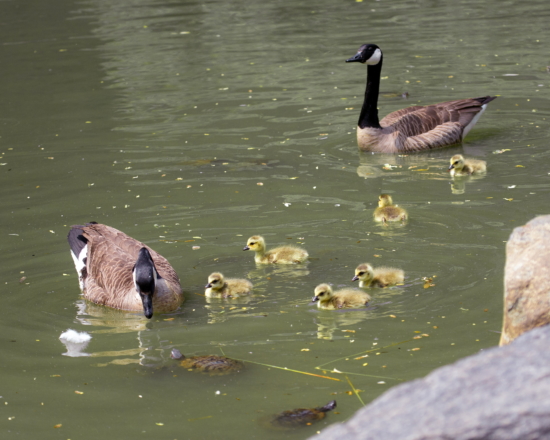
By Lisa Kava
In the middle of May, just as spring arrived in New York City, six goslings were born in Morningside Park. Locals enjoyed watching the newcomers to the neighborhood waddle around with their parents. Photos were posted on Instagram of the sweet family, who brought smiles to the faces of park visitors.
But by the end of June, as their feathers began to come in, it became clear that something was not right. Parkgoers noticed that the goslings’ wings bent out to the sides and seemed to hang low. Photos were posted on the neighborhood app Next Door.
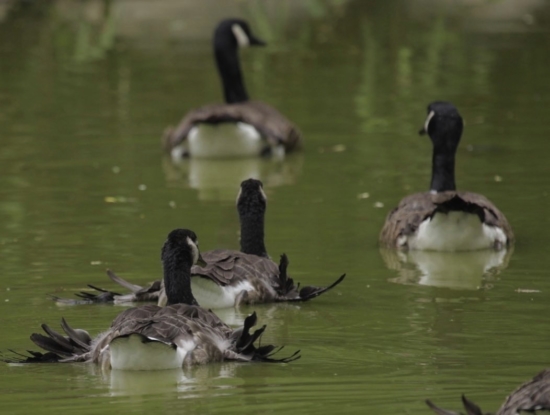
Allison Jones, a senior volunteer for the nonprofit organization Friends of Morningside Park was particularly concerned and reached out to bird rescue organizations hoping for answers. Jones connected with Jessica Hope, at They All Want to Live, and Rita McMahon, the director of the Wild Bird Fund.
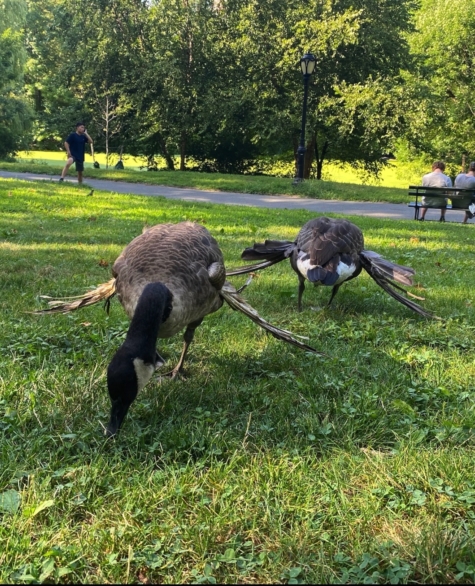
Jones learned that sadly five of the six goslings developed a deformity called Angel Wing Syndrome, and will never be able to fly. The condition can be congenital or a result of poor nutrition, she told West Side Rag in a phone interview, explaining that it often happens when birds are fed bread and processed foods.
“Angel Wing Syndrome occurs when birds do not get enough necessary vitamins and minerals,” Jessica Hope elaborated. “Wild birds are very good at seeking out and finding proper food in the wild but when they are routinely fed unhealthy, human foods, they fill up on this instead of the food they should be eating. This results in the nutritional deficiencies that cause Angel Wing.”
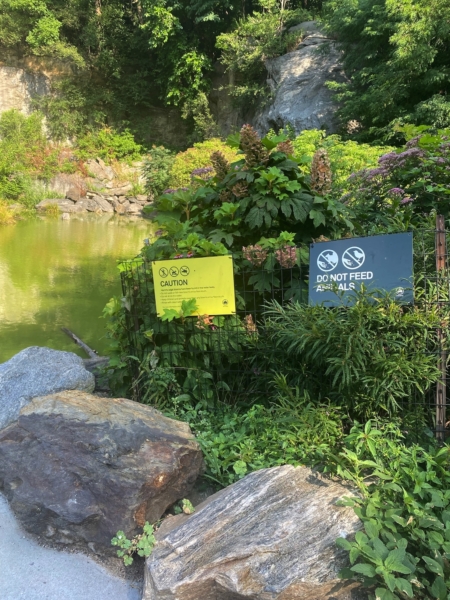
Both Jones and Hope often witness people feeding bread and cheerios to geese in Morningside Park, despite signage which says not to feed wildlife. “The goslings in Morningside Park were being fed junk food.” Hope said.
McMahon, of the Wild Bird Fund, told WSR that if Angel Wing Syndrome is found early enough it could be corrected. “If the birds get to us when they are very young and fuzzy, we can put splints on their wings and help them to fly. Unfortunately, these goslings are past this point in time.”
Birds who are unable to fly may not survive winter. “The problem is that once the ponds and lake freeze the geese cannot get food,” Hope said. “A flightless goose is at risk of starvation and lack of water when ponds freeze.”
Traffic stoppers- CPW and 110th this morning. #birdcpp pic.twitter.com/ZtZVl8q5AC
— Caren Jahre (@CarenJahre) August 13, 2022
McMahon began to search for a sanctuary for these Angel Wing geese. As she was putting together a plan, something unusual and unexpected happened. In mid-August, the parent geese were spotted walking their babies (through traffic) from Morningside Park to a new home at The Pool in Central Park at 110th Street.
“These parents are incredible,” McMahon said. “They really thought about what they were doing and decided that Central Park was a better place for their kids.”
“Canada geese are extremely loyal to, and protective of their families. The parents of the goslings who developed Angel Wing Syndrome in Morningside Park are healthy and flighted, and likely familiar with the city parks and where bodies of water are. When a new flock of geese arrived at Morningside, the parents decided it was best to leave, but their kids couldn’t fly. They walked them from Morningside to Central Park, through traffic. It is incredible but not surprising. They are incredibly intelligent and emotionally complex birds,” Hope said.
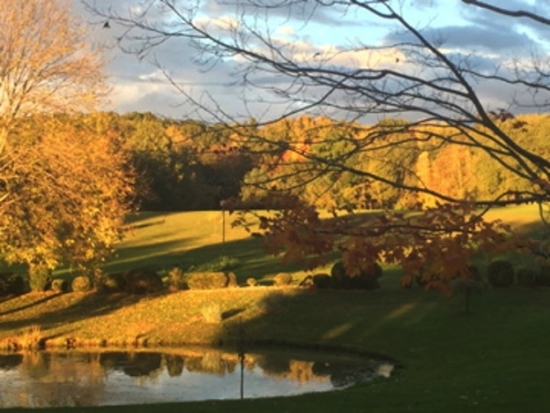
McMahon found a sanctuary in upstate New York that agreed take in the geese. Rangers from the NYC Parks Department will “apprehend the birds once the parents leave and bring them to the Wild Bird Fund,” McMahon said, explaining that the parent geese eventually migrate. Wild Bird Fund will then transport the geese to the sanctuary in Rensselaer County, NY, which hosts other Angel Wing geese, and has two ponds, a heated barn, and a full-time caretaker. “They will have freedom to roam with other birds. This will be their forever home,” McMahon said.
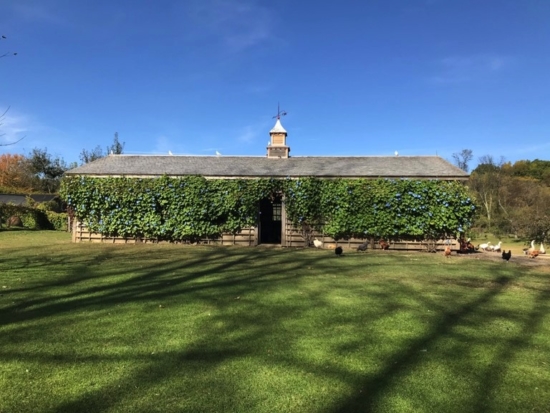
“Our Urban Park Rangers are monitoring the goslings. We plan to keep the family together until the flying adults migrate in the fall. Rangers will work with WBF to transport the birds afflicted by Angel Wing Syndrome to [the] private sanctuary.” a spokesperson for Parks wrote in an email to West Side Rag.
Normally Canada geese parents migrate once their goslings’ primary feathers come in, McMahon explained. “But these parents have shown extraordinary care for their young, taking them to The Pool in Central Park by foot.” WSR asked what will happen if these parents do not leave. “We have not encountered that before, but I think we would take the Angel Wing geese to the sanctuary and let the parents go on with their lives which is the usual pattern of life for geese.”
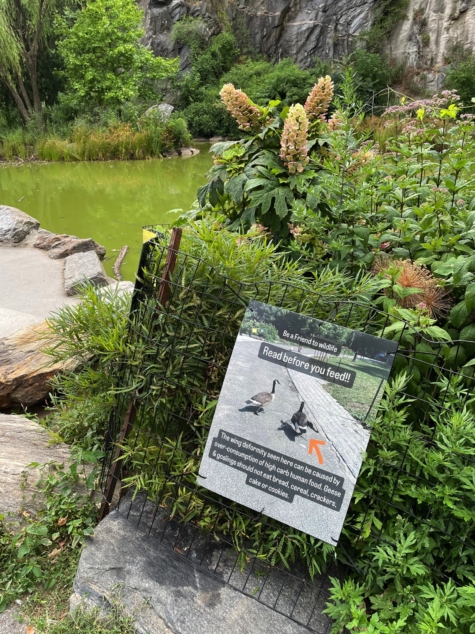
Allison Jones said that new signs with more specific details about the dangers of feeding wildlife have recently been placed by residents. She hopes that with further explanation and education people will not feed the geese.
“I don’t think most people feeding the geese meant any harm. But we really need to raise awareness, it’s so important,” Jones said.
McMahon agrees. “These geese will have a happy life at the sanctuary, but we must spread the word that feeding birds is very harmful. Do not feed the birds. Leave them be. People need to understand there are serious ramifications.”




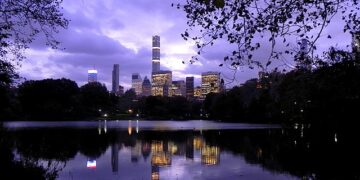




Terrific story about a human being who is making the world better, just a few geese at a time.
Also, hope the new signage catches on.
touching. i agree with the utterance that human food (Cheerios) is junk food. why is it okay—even loved—by humans? we are never anything more or less than what we eat.
about the name ‘Canadian Goose’—never. always Canada Goose, even if it doesn’t sound right.
Wonderful story.
I saw the angel wing birds and signs about not feeding them earlier this summer. It’s great to learn the whole story behind this. A lovely piece.
Probably the signs should be in several languages.
Terrific update on the geese, thank you. Also I hope they can make that sign permanent. It’s so good.
This is a wonderful article. It made me feel like a kid again after reading Bambi, or Old Yeller, or The Yearling. Thank you to all the caring humans who are giving this story a happy ending.
Good story. It should be posted at the pond.
It definitely should be. Great idea!
Slight correction: these are Canada Geese, not Canadian Geese. Their name refers to there breed, not where they come from.
Fixed. Thanks!
A kindergarten friend of mine, both of us from NYC, forwarded me this article which was both sad and ended grand. She knew that because I am an author, Secret Lives of Wild Canada Geese, Barbara Klide, BijouPublishing.com, that I would want to read it and she was right. Canada geese (lower case “geese” or “goose” is correct–I did make an exception in my book’s title) are charming, protective, elegant, and loyal. I became a fan and because they returned each year to nest, got to know them well and each golden set of goslings. My story and that of my workmates is simply amazing. Hope you can get to read it.
Thank you for the Canada geese clarification, Barbara. Also, Amazon will need to stock more books; I purchased the last three copies. I can’t wait to read it and share with my follow geese advocates. <3
What a wonderful story…interesting and informative. Thank you.
Wild Bird Fund does incredible work and is the only federally-licensed rehabilitation center in the five boroughs. They also rely solely on donations. As a WBF volunteer, I know we should all support their unique and important work in preserving our wildlife!
Have been following the geese all summer and saw other Canada geese already at the Pool, also with “angel wing syndrome.” I knew not to feed geese junk food but had never seen the result of the public’s doing so. We need to put signs like this up at the Pond down at 59th St., where I see people come with bags of bread(!!!!) to feed ducks and geese. That is a really popular feeding spot, and there’s llttle signage there.
Lovely story. And I learned so much. Maybe the signs should explain why feeding the birds can result in hurting them.
Lovely story and a good message to those who think they are helping wildlife by feeding them junk food. But I am also wondering what role, if any, atmospheric pollution and specifically pollution of the park lakes contributed to this.
To say that these geese are protective is an understatement. You should see the way they hiss at my dog every time we walk by and they think my pooch is getting too close to their babies. I keep her as far away as possible but it’s never far enough for Mom and Dad.
There are many questions raised by this piece though well intended.
1– Why were the goslings not rescued by Rangers and treated at WBF when first reported as far back as June? Angel Wing was absolutely treatable then.
2– Scientists do not know exact causes of Angel Wing despite studies done. Most theories suggest genetics as primary cause (especially if low gene pool such as NYC parks), but environmental toxins and chemicals could also be factors.
Angel Wing occurs mostly in DOMESTIC birds who are NOT fed “bread and Cheerios” by farmers!
3– This family of geese are residential, not migratory. Moreover, even when migratory, geese fly in family groups. Parents do NOT abandoned their young and these parents have already demonstrated that by not abandoning their disabled offspring as is typical in most animals.
Canada geese do not separate from young until the next breeding season which would be Spring.
4– This family is an interesting documentary case study for “The Adaptability of Canada Geese” — and that is not even to mention their loyalty and devotion.
They are capable of survival in Central Park (even through winter) under the watchful eye of their parents and perhaps
with some human support.
But policy must be established for the rescue and treatment of possible AW goslings before they are 9-weeks-old (as were reported here).
It is not the public who failed this family. It is Rangers and park officials.
Let’s deal with the facts.
I appreciate the comments and questions raised too, Patty. I will add that the two wild bird rescues that I spoke with (before the WBF offered to get involved) said that the birds would overwinter just fine as long as the weather did not get too, too severe. In which case, they would require water and food for a short time. CP may not want to deal with that, I suspect.
I would also hope that, if relocated, the rangers would relocate the ENTIRE family, as you suggested. The two other rescues confirmed what you stated – that the parents will most likely remain with the flightless geese through the winter, unless the weather turns extremely cold.
Also very interesting about the cause of the syndrome. I couldn’t find any specific research on this but one rescue and the WBF did suggest it COULD be genetics – although I can’t imagine the copious amounts of process food helps (which I witnessed often while they were young in Morningside Park). BUT — Some might recall that two years ago (or maybe last year) the two geese nesting on the island in Morningside pond sat on eggs that never hatched. She sat on that darn nest into the heat of JULY! It was so sad. I wonder if these are same nesting pair? Which could suggest a genetic component for this pair. It’s so interesting – wishing we all had an easy way to know the answer!
I don’t know if anyone reported the syndrome to NYC Park rangers early enough either. When I first reported it to the WBF is was already too late to correct. So sadly, I don’t know if anyone noticed it, or reported it, as their feathers were first emerging. 🙁 We, the park volunteers, will notice it next time, if there is a next time, now that we know what to look for. That is for certain! 🙂
Thanks again for your comments! Allison (with Friends of Morningside Park)
Thank you for posting this. The Wild Bird Fund on the UWS is an incredible place dedicated to caring for birds sharing our beloved city. I love passing by their front window — every time I do I feel grateful to the organization for all the hard work I know they do. If anyone is able to make a donation, please join me: https://wbf.app.neoncrm.com/np/clients/wbf/donation.jsp